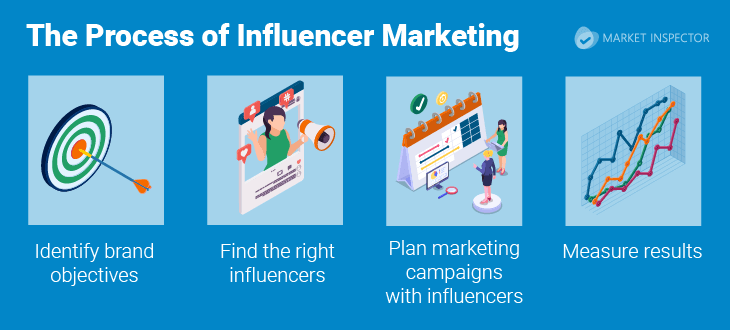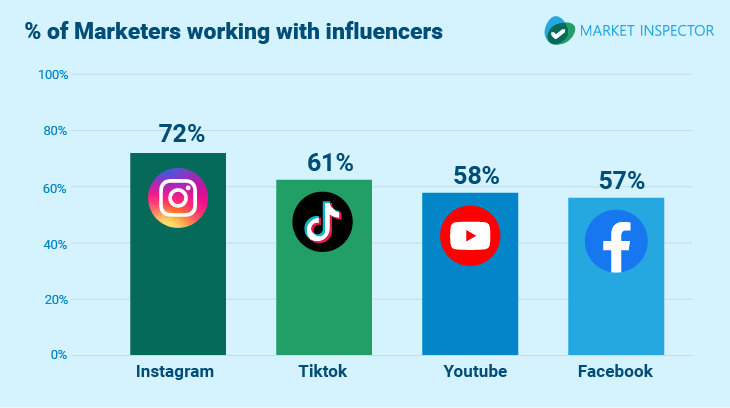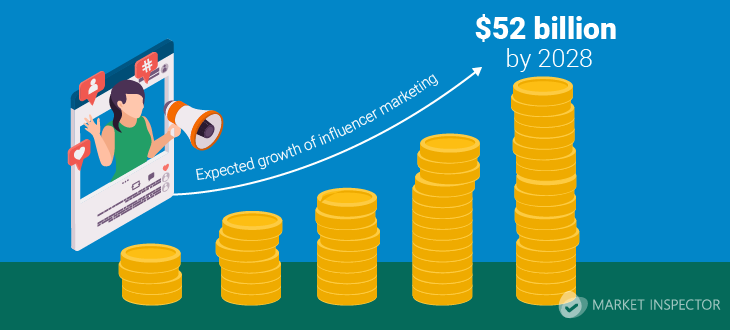- Market-Inspector.co.uk
- Blog
- Influencer Marketing Statistics
Influencer Marketing Statistics 2025
Global B2B Influencer Marketing Statistics 2025


In today's digital age, where information overload is at its peak in a variety of platforms, cutting through the noise and capturing the attention of your target audience can be quite daunting. This is especially true in the B2B (business-to-business) marketing world, where complex products and technical jargon can often leave potential customers feeling lost.
Enter influencer marketing – a powerful strategy that leverages the credibility and reach of influencers to promote your brand.
Influencer marketing is an age-old marketing strategy that rose to popularity in recent years due to the rise in social media usage. Brands have always relied on using famous people to advertise and advocate for their products, and at that time it was either through satellite television ads or newspaper and radio ads. In simple words, influencer marketing is a collaboration between a brand and an influencer, wherein the latter endorses the brand and tells their fanbase the benefits of using products and services from that brand.

The general tendency of people is that they aspire to be like their role models. Celebrities are popular figures who have the power of influencing masses, and banking on them to advertise your brand seems to be an effective way to reach the target customer base.
The rise of social media made it possible for influencers to have a more intimate connection with their fanbase, and this makes it easier for brands to collaborate with influencers and create effective marketing campaigns.
Is Influencer Marketing an Effective Strategy?
Take a day in your life and closely observe how much of an impact influencer marketing has on you. Many people use social media as a way to find information or research about any product they’re looking to purchase. It’s because they would like to hear from other people about their experience with that product. Basically they’re looking for reviews and when they come across their admired celebrity endorsing that product, they tend to jump on the bandwagon and purchase it.
According to Hubspot, 25% of all marketers use influencer marketing as part of their overall marketing strategy. Now the question is: how many influencers are there? And who can be called an influencer.
There are influencers with small, medium and large following, and depending on the marketing budget and type of products that brands need to promote, they use influencers of all sizes. We will talk more about different types of influencers and their costs in the article later.
How Much Impact do Influencers Have?
Influencers have a positive effect in moving people ahead in their buying decision process. They raise brand awareness, brand image and help customers trust and engage with the brand.
There are many resources with global influencer data that shows the effectiveness of influencer marketing specially on Gen Z and Millennials who are the majority population that actively uses various social media platforms. Brands also provide data and results for influencers who should have the chance to see the effectiveness of their contribution.
15 Global Influencer Marketing Statistics (2024)
- The global influencer marketing market is booming, projected to reach a staggering $22.2 billion by 2025, according to The Goat Agency. This represents more than double the market size in 2020, highlighting the growing importance of influencer partnerships in marketing strategies.
- As of February 2024, brands collaborated with 37.6% of influencers worldwide. 14.7% of respondents said that they worked with over a thousand influencers.
- This growth is reflected in the budgets allocated by marketers. A study by Influencer Marketing Hub found that over 85% of respondents plan to dedicate a portion of their budget to influencer marketing in 2024. Furthermore, nearly 60% of those with existing influencer marketing budgets intend to increase their spending over the next year. This trend indicates a growing confidence in the effectiveness of influencer marketing for B2B brands.
- Instagram (72%) is the leading social media platform where marketers work with influencers, followed by Tiktok (61%), Youtube(58%) and Facebook(57%).

- 80% of the marketers approach smaller influencers with less than 100k followers.
- In 2024, we can expect to see a continued shift towards nano and micro-influencers, who have smaller but highly engaged followers. Research indicates that nano-influencers with less than 10,000 followers tend to have higher levels of trust and authenticity among their audience, leading to better engagement and conversion rates for brands.
- Transparency and authenticity will remain key pillars of successful influencer campaigns in 2024. Consumers are becoming more discerning and value honesty from influencers they follow. Brands that prioritize transparent partnerships and genuine content are likely to see better results and build long-lasting relationships with their audience.
- Video content is expected to dominate the influencer marketing landscape in 2024. Platforms like TikTok, YouTube, and Instagram Reels will continue to be popular channels for influencer collaborations. Brands are increasingly investing in video content to create engaging and shareable experiences for their target audience.
- A very high majority, 86% of marketers agree that influencer marketing is one of most effective ways to promote your brand.
- Trust among people towards social media influencers is at a high of 61% where they believe that they’re influencers are genuine when it comes to promoting brands.
- 85% of B2B brands used influencer marketing partnerships in 2023, compared to only 34% in 2020. The era of covid also brought up a trend of rise in social media influencers and this shows the correlation between the growth of influencer marketing and the growth of influencers.
- Influencer marketing around the world is expected to grow to $52 billion by 2028, which is double of what it is today. Trends show that this new age style of using social media influencers is here to stay.

- Every social media or internet user spends an estimated $5.60 in 2024 due to influencer advertisements.
- 43% of Instagram marketers are willing to increase their marketing spend on the platform in 2024. The remaining 46% are planning to keep the same budget for using influencers of different sizes.
- 63.2% of marketers prefer to work with influencers they know, which means that they have worked with them for more than one campaign as they have seen the return of investment working with established influencers in their network.
Influencer Marketing Costs in 2024
In 2024, brands are faced with the challenge of choosing between micro-influencers with niche followings and macro-influencers with larger reach. While macro-influencers may demand higher fees, micro-influencers often offer higher engagement rates, making them a cost-effective option for brands looking to maximize their marketing budget.
Advancements in AI tools are changing the way brands do influencer marketing in 2024. They can now harness the power of social media analytics to identify the most relevant influencers for their campaigns, optimise their marketing strategies, and measure the impact of their influencer marketing accurately.
Is influencer marketing worth it? In an era where authenticity is paramount, brands must strike a delicate balance between working with influencers who resonate with their target audience and staying within their budget.
Allocating a budget to use the right influencers that have the most relevant audience and positive engagement are crucial to influencer marketing. The scope of influencer marketing in the coming years and the rise in social media and internet usage makes this channel essential for every marketer.

Valli is the Digital PR & SEO Manager at Market Inspector. She has an educational background in business management and marketing. She is a passionate digital marketer and enjoys building her skills within SEO, online marketing and PR. She holds over 5 years of experience in creating content, B2B marketing, link building and digital networking. Her focus lies in the areas of business, marketing, green energy and sustainability, to name a few. Her work has been published in various media such as Entrepreneur, Business Insider, Creativebloq, Designtaxi, and more.
We strive to connect our customers with the right product and supplier. Would you like to be part of Market Inspector?

